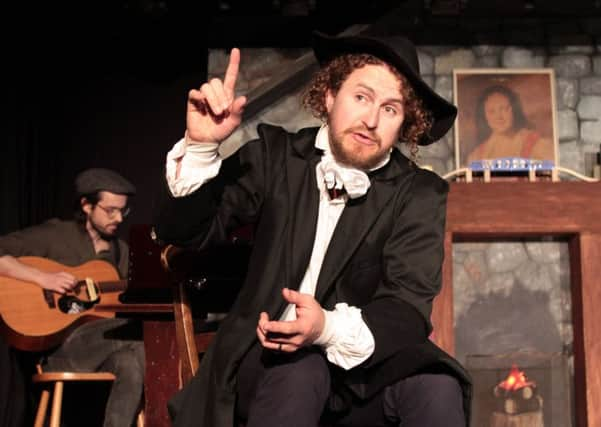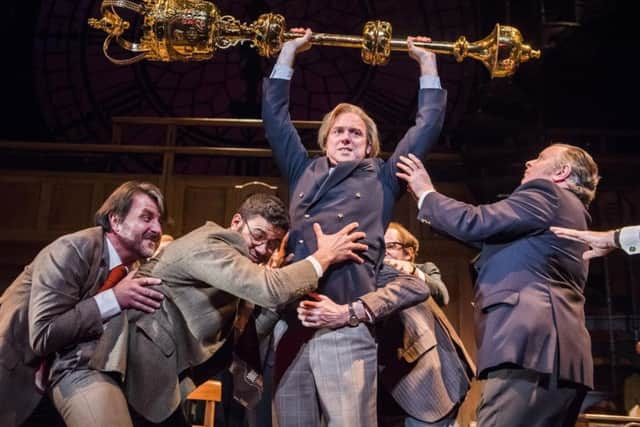A man of terrible rhymes but recognisable for all time


McGonagall’s Chronicles
Oran Mor, Glasgow
JJJJ


This House
Festival Theatre, Edinburgh
JJJJ
IT’S a strange fact about William Topaz McGonagall that although he is acknowledged as Scotland’s worst-ever poet, he is also one of the best known; and it’s an irony not lost on award-winning writer and performer Gary McNair, as he sets out to chronicle McGonagall’s strange life for Play, Pie And Pint audiences in Glasgow and Edinburgh. Born in Scotland or Ireland some time around 1825, McGonagall grew up in Dundee, followed his Irish parents into the weaving trade, and took to poetry only during the great weaving slump of the 1870s, when he was already over 50. And if he could not earn money by being a good poet, it seems he was prepared to earn it by being a notoriously bad one – even if that meant standing on stages across the land, being pelted with rotten vegetables by ruffians in the stalls.


This is the ineffably sad yet defiant tale told by McNair in his latest brilliant theatrical monologue, enlivened on this occasion by on-stage exchanges with musician and actor Brian James O’Sullivan, while fellow-musician Simon Liddell keeps his own counsel at the keyboards. With even the programme notes – as well as the entire play – written in McGonagall-esque rhyming doggerel, McNair is clearly in explosively creative mood; and what he produces, in the end, is a portrait of a man so desperate for any scrap of monetisable recognition that he will literally tolerate any humiliation to achieve it.
Advertisement
Hide AdAlthough McGonagall is an extreme case, there is something painfully recognisable about his plight, not only to any artist, but to anyone who has ever suffered the pains of unemployment and socio-economic oblivion. And although the story is a sad one, McNair also captures his subject’s tremendous, vivid energy, as he defiantly pursues his chosen path. There are songs, there is verse, there is a perfectly-pitched production by Joe Douglas; and behind the story of McGonagall, there is a backbeat of sadness about the struggle of Scotland’s working class people to achieve any real recognition in a literary culture that is never quite their own, and in which McGonagall – a painfully poor Scotsman of Irish origin – enjoyed the kind of triple disadvantage that would have silenced many a man with more talent, and less purblind determination.
One of the tragic threads in McGonagall’s story concerns his touching faith in the wisdom and bounty of Queen Victoria, to visit whom he once walked from Dundee to Balmoral, and back again, after being refused entry. And for all its superficial satirical energy, there’s something of the same mystical attachment to fabled British institutions in This House, young playwright James Graham’s acclaimed play – first seen at the National Theatre in London in 2012 – about the high drama played out at Westminster between 1974 and 1979, when the Wilson-Callaghan Labour government, with a parliamentary majority of just three, was trying to fend off the resurgent Tories and prevent the arrival of the Thatcher era.
There’s no faulting the huge energy and sharp choreography of Jeremy Herrin’s spectacular production, which takes place on a wood-panelled stage lined with audience members sitting on Commons-style green benches, under a huge Big Ben clock-face; and there are a series of fine, vigorous performances from the half-dozen actors playing the party Whips, in whose offices most of the drama unfolds. Martin Marquez and James Gaddas are outstanding as chief Labour whip Bob Mellish and his deputy Walter Harrison, Matthew Pidgeon excellent as future Speaker Jack Weatherill, and Natalie Grady all too convincing as first-ever woman whip Ann Taylor, who just wants to be one of the boys.
The minor characters, though, are played as such a series of grotesques, with extreme regional accents and dreadful Little Britain wigs, that the overall effect is – as usual with British establishment drama – to make the posh chaps in the Tory Whips office look like the voice of reason and constitutional wisdom, when in fact they are often anything but. It’s an entertaining evening, in other words; but in the end, it treats the real issues dividing British society in the 1970s a little too lightly for comfort, and therefore has far less to say than it should, about the grim political plight in which we find ourselves today.
JOYCE MCMILLAN
McGonagall’s Chronicles is at Oran Mor today, and at the Traverse Theatre, Edinburgh, 3-7 April. This House is at the Festival Theatre, Edinburgh, final performances today.